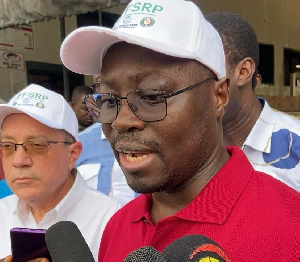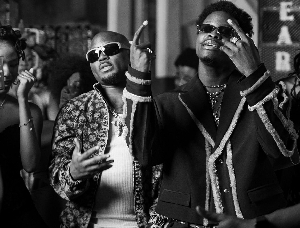By Dr. Michael J.K. Bokor
E-mail: mjbokor@yahoo.com
September 12, 2010
About two months ago, we heard that President Mills had contemplated resigning in protest against the persistent scathing criticisms (or personal attacks) against him by his own party’s bigwigs. Some of us cringed and hoped that such a hint might be just a figment of somebody’s imagination. We let it pass by without much ado.
Then, just a few days ago, the threat resurfaced when Alhaji Bature, an NDC insider and Castle been-to, brought the matter back into the public domain. According to him, if the spate of bad-mouthing and needless denigration of President Mills continues, he will have no option but to throw in the towel to save his good name. Among others, Alhaji Bature reasoned that President Mills will do so because unlike some people who do all they can to grab political power and hang on to it, he “is not power-hungry.” In other words, President Mills may be in power but he doesn’t love power. Instead, he loves his good name.
Coming from a deep throat of this sort, this threat to resign is worrisome because it suggests that the situation is more serious than one may guess. If President Mills does resign, he will set an enviable record. In our part of the world where people do all they can to grab political power and to hold on to it “till death do them pass,” it will be unimaginable for him to willingly relinquish his grip on the political clout just two years into the mandatory four-year tenure. But setting such a record is not the issue.
I am more concerned about the implications of such an abrupt resignation. Of course, our Constitution provides a safety net in this circumstance for the Vice President (John Dramani Mahama) to fill the vacuum. That replacement in itself may not be unproblematic because the forces arrayed against President Mills are likely to jump on Mahama too for reasons best known to themselves. Being part of the government that they have not ceased to torment, these critics of President Mills will definitely paint John Mahama with the same long brush and extend the same hand of trouble to him. The trend will not change. That’s the problem.
So, why am I worried at all? I am because the implications of any decision by President Mills to resign will be dire for the NDC, in particular, and the country, in general. His resignation will throw the NDC into tatters and pave the way for the NPP to return to power on a silver platter. Apart from this fallout, it will create a dangerous situation, especially if the CPP or the PNC (the most viable parties representing the pro-Nkrumahist tradition) fail to measure up to the electoral tasks. In this case, then, the NPP will enjoy an overwhelming majority that will not augur well for the country’s democracy. An unwanted de facto one-party system will emerge.
Against this background, it behooves all those in the NDC who want to wear their power on their sleeves to examine carefully their attitude to politicking. If they fail to reappraise the negative impact of their egomania on the party’s political future and to make amends, they will work toward consigning the party to the political doldrums. Considering the seemingly entrenched positions now being taken by the main influential persons involved in this intra-party squabbling and needling of President Mills, I am afraid that the repairing of relationships may take too long to accomplish. But it is a task that must be done now!
It beats my imagination why the eye-popping implications are not yet clear to these NDC functionaries always tugging at President Mills’ patience. Considering the harm that the Kufuor-led NPP government caused them while the NDC was in the opposition for eight years, they should have known better how to use the goodwill that the Ghanaian electorate gave President Mills to redeem their image. Fighting among themselves while in power only to lose that public goodwill should not be part of their purview at all; but it seems they are bent on destroying the party’s chances of retaining power. They are behaving like a dog that is determined to get lost and thus refuses to hear its master’s whistle. Shame unto them.
Indeed, former President Rawlings (founder of the NDC) is on record as the worst offender. Having been a thorn in the flesh of President Mills and calling him by several unbecoming names, he has harmed the NDC’s interests and must be told the truth. If he sets out to write President Mills off as an incompetent leader, how will the electorate judge him at the 2012 polls? Or will any other contestant be fielded?
Any clandestine move to pit Nana Konadu Agyemang-Rawlings against him and to twist the arms of the so-called “cadres” of the NDC to root for her at the NDC Congress will further throw the party out of control. Indeed, the jostling for attention that Nana Konadu has been doing these days suggests that she is nursing such a hope. If Rawlings and his followers want the NDC to stand on its feet and not implode right in front of their eyes, then, they should look for better ways to handle matters. The writing is clear on the wall that any act that unjustifiably clips President Mills’ wings will have a far-reaching devastating effect on the NDC than they can handle.
True to its nature, though, the NDC is only exhibiting its variegated nature as a political organization made up of people from varying political camps. Those in it come from the Danquah-Busia camp, the pro-Nkrumahist camp, and the pro-Rawlings camp (made up of both “old guards” of the June 4 era and the “new guards” captured at the inception of the PNDC). That’s why the NDC touts the “Congress” element. But this conception is no warrant for head-butting even though it is also the source of the problem. Unlike its counterparts that pride themselves on a time-tested ideology, the NDC has been struggling with such a focus until the current turn toward “Social Democracy.” The NDC activists appear not to have blended properly to present a smooth political texture for the party. Rawlings’ personality and ideals seem to be the fulcrum, and any move away from that point threatens internal cohesion.
President Mills can safely be labelled as a “new guard,” not having begun his political march within the NDC circles with the June 4 mantra of revolutionary fervor that the “old guards” pride themselves on. Despite his baptism of fire on the occasion of the “Swedru Declaration” by Rawlings, there is ample evidence that he is not fully accepted by the “old guards.” This lack of recognition may be at the root of the current wanton excoriation by those in the Rawlings camp to whom governance connotes “revolutionary action” (against opponents). Let’s remember that one of the major causes of the bad-blood relationship between the Rawlings camp and that of President Mills is the reluctance of President Mills to go after the NPP government officials alleged to have stolen public funds and property. That is his political Waterloo. A leader with a “revolutionary fervor” won’t do as President Mills does, his critics intone.
While being buffeted by severe criticisms from his own party functionaries (leading him to what he calls treachery and let-down), President Mills has become an easy picking for his political opponents in the NPP, especially. Just recall Akufo-Addo’s name-calling (“President Do-Little”) and President Mills’ response (being happy that he wasn’t labelled as “President Do Nothing”) and you can see why President Mills needs more empathy and encouragement from his own party than what he has been subjected to so far. For him, it is just like being helped to climb the mountain only to be pushed to the precipice and ordered to jump back down into the valley of death. To avoid that tragedy, he is contemplating resigning mid-way on the journey, as we are being told. This is where the crux of the matter lies.
Resignation should not be the way out, Mr. President. Instead, I advise you to remain steadfast and focused on your legitimate purview while ensuring that your government takes appropriate measures to solve the problems that you identified and promised to solve, which endeared you to the electorate. You have the mandate and must use it to leave a better legacy than to prove your critics wrong. Don’t truncate your legitimate tenure this way to create problems for our democracy.
Let me remind you of two memorable occurrences to energize you in the saddle. As a pro-Nkrumahist, you must know what happened to the Great Osagyefo despite all the hard work that he had done to win independence for the country and to launch it on a path of concrete development. At his overthrow, Ghanaians went into wild jubilation, calling him a tyrant, who won’t even allow them access to milk. Nkrumah was reported as saying that if he had known that it was milk that Ghanaians wanted, he would have made the gutters of Accra flow with it. Alas, it was too late.
On his part, the late Ignatius Kutu Acheampong, whose efforts to rebuild the country economically (through the “Operation Feed Yourself” campaign) and politically (through the “Union Government” model) did not assuage doubts among Ghanaians. He fell from grace to grass and was stripped of all his military honours. Summing up his impressions about Ghanaians, he said “Ghanaians are difficult people.”
These experiences should remind any leader that it is difficult to lead human beings. But endowed with the qualities that made the people choose him as their leader, in the first place, such a leader must carry on with the tasks to the best of his ability and with good intentions, too. Indeed, judging from the temperament of Ghanaians, one may not be far from right to say that they need a superman (or super-woman) to solve their problems overnight. President Mills is no superman but he is doing his best in the circumstance, however slow the pace may seem to us. What are we doing to complement his efforts?
So far, he has demonstrated good moral traits—selflessness, devotion, and humility (rare commodities in our contemporary politics)—and given the impression that one can do politics in Ghana without necessarily hankering after its material fruits to the detriment of the nation. In this sense, it is worth appreciating his efforts and supporting him to perform the arduous task of rebuilding the country. Others have been where he is today. We know what they did, and should see the difference clearly enough to give him the peace of mind he needs to complete his tenure.
The bottom-line must be clear by now: Those in the NDC who think that undercutting President Mills will help them achieve their goals will be disappointed because a loss for John Atta Mills in this current political dispensation is a total loss for the NDC.
Opinions of Wednesday, 15 September 2010
Columnist: Bokor, Michael J. K.














